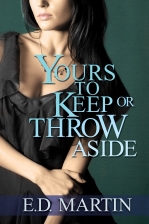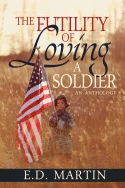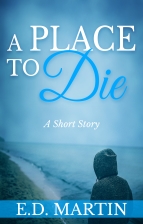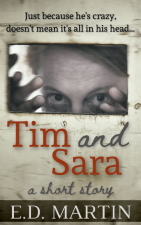This week’s interview is with historical romance author Samyann, who’s just released Yesterday: A Novel of Reincarnation.
In Yesterday, Amanda is afraid that everyone she loves will leave her. But then she meets police officer Mark and is hit by a sense of familiarity. Guided by her elderly godmother Mary, Amanda uses past life regression analysis to connect with the story of Bonnie, a girl growing up in the shadow of the Civil War and later in 1870’s Chicago. As the novel progresses, Amanda must decide just how much influence her past will have on her future with Mark.
Samyann recently chatted with me about writing historically accurate stories, self-publishing, and reincarnation.
Me: Your novel, Yesterday, has three settings: Chicago today, Chicago in 1871, and Charleston, SC, during the Civil War. Obviously as a native of Chicago you know a lot about the first one. How much research did you have to do for the other settings?
Samyann: Being a native Chicagoan, it’s not really surprising that I have, over time, picked up quite a bit of the history of the city. I think I learned about much of the Great Chicago Fire history when I was pre-teen. For example, the fact that Chicago’s streets were made of wood blocks covered with tar prior to the fire. There was more research with regard to South Carolina and the Civil War era. The fact that the internet is available to make such research pretty simple, it not only didn’t take very long, but has supplied me with a great deal of information that isn’t in the book.
Me: Did you travel to Charleston while you were writing the book?
Samyann: Not while working on Yesterday. But, in a previous life, I traveled a great deal. Charleston, and the King Street Antique District, which is part of Yesterday, was visited. I didn’t visit St. Michael’s Church, though. I wish I had, simply because of the awesome history of the bells.
Me: Previous life as in a hundred and fifty years ago? :D
Samyann: Pretty close!
Me: What kind of websites were the most helpful to you in your research?
Samyann: The websites that helped the most were library, newspaper archives, and city sites. An example is The Charleston Mercury website. Bonnie’s father, one of the characters in Yesterday, reads about the battle of Shiloh in the paper. This battle was chronicled by The Charleston Mercury, and you can read about it on-line today. There are also quite a few sites devoted to the Civil War. Dates were relevant to accurately convey character ages. Chicago has it’s own valuable resources, such as the Chicago History Museum and website, Historical Society, too. These helped a great deal given the fact that Lincoln, an Illinois politician, is factored into the story, if only for the escape of the characters into Lincoln Park from the Chicago Fire.
Me: The Chicago History Museum provided you with a picture for your cover, right?
Samyann: That’s correct. It is a terrific diorama that can be seen at the Chicago History Museum, at LaSalle Street and North Avenue.
Me: Did you just call them up and ask to use it for your cover?
Samyann: Yes. I simply made a phone call. There is an agreement I had to sign, which allows for a certain number of copies. If I manage to sell ‘X’ number of copies of their image, the agreement will be re-written. I will be delighted to re-write the contract ;-)
Me: Past-life regression therapy plays a huge role in your novel. Did that require a lot of research too, or were you already familiar with it?
Samyann: I think the concept of regression is something everyone has wondered about. I’ve the same fundamental knowledge about the topic as everybody … that and curiosity, primarily. Toss in some imagination, and voila. Seriously, I did do considerable research into the process of regression, bringing someone into an ethereal state. I wanted people who are studied in the process, and even those who are not, to sense reality. The concept of using the pendulum of the clock as opposed to the hypnotist swinging a shiny object or watch just seemed logical.
Me: I think you’re definitely right, that everyone has wondered about reincarnation at some point. Given that, and all you probably discovered with your research, how plausible do you think your story is? In other words, do you believe in reincarnation?
Samyann: As indicated in Yesterday, a few billion people on earth believe in reincarnation, so I’m not sure I’d put up a very good case against the concept. I think the plausibility is there, sufficient enough for the reader to simply ask themselves, “what if … or why not?”
Me: Way to dodge the question. :)
Samyann: Cool, huh.
Me: If it is possible, who do you think you might have been in a previous life? Someone famous? Some ordinary?
Samyann: I’m sure someone equally as ordinary as I am today.
Me: What about the idea in the story that our paths are connected with someone else, throughout all our lives? Do you think that’s possible too?
Samyann: Why not? That’s a concept in reincarnation called “soul pods,” traveling through many lives within a group of souls. In reality, the entire concept of reincarnation is speculative, with many different thoughts. I don’t think anyone could say with a degree of surety that any one possibility is impossible. That negates the idea of speculation, which is basically what Yesterday is about.
Me: You definitely have a soul pod going in Yesterday, with Amanda, Mark, and Mary connected both in the present and the past. I think from a reader’s perspective, though, it makes it a lot easier to connect the two stories. Amanda=Bonnie. Amanda’s struggles parallel Bonnie’s struggles.
Samyann: Don’t forget Oprah and Electra :-) [my note: those are Amanda’s and Bonnie’s cats]
Me: It goes to show that while Yesterday is a romance, it’s not just about the love story between Amanda and Mark; it’s about coming to grips with your past and letting go of it so you can move forward. Do you think this theme is something that’ll resonate with your readers?
Samyann: I hope so. I’d like the reader to grasp that happiness is in reach for everyone. But, your happiness today is in your future today, not your past … Yesterday. EWWWW, how cool is that!
Me: How similar is Amanda’s character to you?
Samyann: Well, she’s young and beautiful, so we can nix that part :-). Maybe a few decades ago we would have had more in common. Primarily I think, if anything, some of my life experiences might be in her character, a bit. But, they’re also in the other characters. Mary’s in particular.
Me: I think Mary might be my favorite character. She’s the ideal old woman – lively and comfortable enough with herself to say and do whatever she wants. That’s how I plan to be when I’m old.
Samyann: She’ll tell you to have at it, and “don’t pick fly shit outta pepper.”
Me: That’s disgusting, by the way.
Samyann: LOL
Me: On a completely non-disgusting topic, you self-published not only a hard copy of your book, but you’ll soon have an e-book and an audio book. What are your overall thoughts on the whole process?
Samyann: That it takes time. Lots and lots of time. That it’s not as expensive as I thought it would be. Granted, I did spend a bit to have a custom cover design, and purchased the services of a narrator for the audiobook. But, beyond that, the entire publishing process has been free. I think given the state of affairs with the publishing business today, what an individual with average tech-savvy ability can do, there really is no option anymore. Why would I use a conventional publisher to do what I can do? The biggest marketing effort they do for you is to list your book with Amazon and a few other on-line and bricks & mortar bookstores like Barnes & Noble. Well, I can do that myself so I fail to see why I shouldn’t.
Me: So you’d do the same thing for your next novel?
Samyann: Absolutely. Unless some big publishing outfit offers me a huge advance, which we know won’t happen.
Me: I just read a quote by author Jon Scalzi, who said, “Hey, I became a writer to get rich.” Is that your motivation?
Samyann: No. I write because it’s fun, I’m retired with little else to do, and I always wanted to write when I had the time. When you’re retired, everyday is Saturday.
Me: Fair enough. :) What tips do you have for other writers who want to get published?
Samyann: If you have what you believe to be a good story, and others have told you it’s a good story … don’t wait for the gatekeepers (agents), do it yourself. There are many avenues. Get your book read by others, join a critique site. Yesterday-Chapter 1 had close to 100 critiques. Many people need to tell you that you have a good story, not just “mom.”
Make sure to check out Samyann’s book, Yesterday: A Novel of Reincarnation. You can also connect with her on Twitter – @Samyann_Writer – or at her website.












